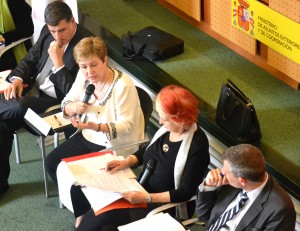April 8, 2014
The second round of the Humanitarian HardTalk series “The Multiple Faces of Humanitarianism” kicked off April 7 with Kristalina Georgieva, the European Commissioner for International Cooperation, Humanitarian Aid and Crisis Response.

Manuel Sanchez-Montero (AECID), Kristalina Georgieva (EU), Rosa Maria Calaf, and Ed Schenkenberg (DARA)
The second round of HardTalk Series
No one owns “humanitarian action” and there is no copyright on the word “humanitarianism,” which has been used to describe the principles and practices of humanitarian action. Some would say that the use of the word ‘humanitarian’ has been abused, as it has become a label to describe many different actions, many times far from anything resembling it, and sometimes to the point of extreme such as when in 1999 NATO called its intervention in the Kosovo conflict ‘a humanitarian war’.
DARA and AECID’s (Spanish Agency for International Development Cooperation) second round of Humanitarian HardTalk series aims to reflect on the widely diverging views on humanitarian action in the run up to the World Humanitarian Summit in 2016. For more information, view the full programme.
Read the report “Now or Never: Making Humanitarian Action More Effective“, which contains the main points debated during the first round of Humanitarian HardTalk Series Dialogues in late 2013.
Kristalina Georgieva: Diversity within the European Union
During the first session of “The Multiple Faces of Humanitarianism”, Ms. Georgieva, together with DARA’s Chief Executive Ed Schenkenberg, AECID and Head of the Humanitarian Action Office Manuel Sánchez-Montero, and representatives from Spanish NGOs, debated the issue of diversity within the EU. The event was moderated by Rosa María Calaf, leading Spanish journalist and Former RTVE correspondent.
Some major discussion points included:
- A more complex operating environment: an increase in the number of people suffering, different types and compounding risks, and more and diverse needs require different skills when carrying out humanitarian response.
- Diversity within the EU matters but should not be pursued blindly as it can lead to fragmentation. Diversity is beneficial when partners can work together, building effective alliances, to deliver effective and accountable humanitarian responses.
- Diversity of funding sources, while a positive development implies a diversity of donors and actors, and these do not always operate from shared principles, or understand these in the same way. Some of the ‘newer’ donors have different ways of providing humanitarian funding. They work more bilaterally and may connect their humanitarian objectives with their development and even foreign affairs objectives. Some of them will also add their specific interests to the traditional humanitarian principles of independence, neutrality and impartiality. They may emphasise the need for adhering to the sovereignty of states.
- The phrase “principled humanitarian action” is now so widely used that it risks being meaningless. The question was raised what donors can do in terms of pushing humanitarian organisations (especially to those whom they fund) to be more clear in explaining their way of applying humanitarian principles.
- Diversity in terms of the humanitarian role: while humanitarianism may include many different approaches and activities, it was argued that the ‘resilience agenda’ has blurred the focus of humanitarian actors on the immediate needs of affected populations. Building resilience is a development activity and humanitarian organisations should press their development partners to take up this responsibility. Likewise, it was agreed that humanitarian actors are not responsible for political solutions, but should advocate for them to be reached by governments. The resilience talk of donor governments may be an excuse to not find political solutions or tackle the root causes of crises.
- Perceptions matter just as much as reality: The EU is a political entity and thus has to take extra care to make decisions based on actual needs and capacity to deliver assistance (access) to avoid being perceived as blurring its political and humanitarian agenda.
- Main differences among EU members include: history, economic power, where humanitarian aid falls within Government, support to UN and NGOs, views on civil-military cooperation, military presence, generosity and public support for humanitarian action.
The next two HardTalk Events will take place with ICRC Director-General, Yves Daccord (24 April) and OCHA’s Operational Division Director, John Ging (tbc).
Share this